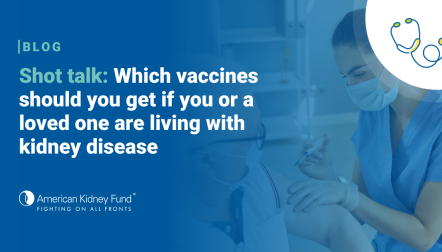
Blog post
'Just a little plain country girl can change the world': Towana Looney helps break new ground as the longest-living person with a gene-edited pig kidney

On Nov. 25, 2024, Towana Looney came out of a transplant surgery at NYU Langone with a working kidney.
"I emerged from surgery, and I already could feel the blood flow from my kidney, and I told [my doctors] how strong the kidney was," recalled Towana. "And everything I was told that could happen, didn't happen… the kidney was working before [the surgeon] sewed me up."
But what set this transplant apart from the nearly 30,000 kidney transplants performed in the United States last year was the organ itself. Towana became the fifth living person in the U.S. to receive a gene-edited pig kidney. And she made history as the longest-living recipient of a pig kidney.
Towana had previously undergone a kidney surgery in 1999. That time, she was the donor, giving one of her kidneys to her mother. Two years later, she developed preeclampsia when she gave birth to her child. Preeclampsia is a serious medical condition during pregnancy in which women experience high blood pressure, swelling, blurry vision, headaches and protein in their urine. Unfortunately, high blood pressure can cause damage to kidneys, which is what happened to Towana. In 2016, the damage progressed to kidney failure and Towana began in-center dialysis treatments.

"I had been on the transplant list since 2017, and I was at the top of the list because I gave my mom a kidney," said Towana. Unfortunately, it was determined she wouldn't be able to get off the list because she had also developed unusually high levels of harmful antibodies – another consequence of the preeclampsia.
Her high levels of antibodies – which the blood produces to fight infections or viruses – meant Towana's body would almost certainly reject a new organ. Towana even joined a clinical trial to test a drug that would get rid of the unnecessary antibodies, but unfortunately, the drug did not work. She was running out of options.
That's when Towana first learned about the recent strides in xenotransplantation (transplanting organs or tissues from one species into another). "I went to dialysis after seeing it on the news, and asked my social worker at dialysis could she sign me up and find out how I can get in the program."
With her social worker's help, Towana was enrolled in the trial. Eventually, Towana's doctor told her she might have a kidney for her, "but it's not a human kidney."
"She said, 'It's a pig kidney' and I said, 'When do we start?'" Towana said.
Her doctors explained all "the ins and outs," making sure Towana knew that it was a risky option, that it was "new ground that nobody had experienced."
"I just think this is the best thing ever that could happen to the mankind," said Towana. "It's like the man walking on the moon."
She and her doctors met every couple of months prior to the surgery, and every time she was asked if she was sure she wanted to proceed, and Towana assured them, "I'm not going to change my mind."
"Because I told her just because it didn't work for that person don't mean that it won't work for me, because my health situation is not the same as theirs," said Towana, referencing the two previous living recipients of gene-edited pig kidneys who passed within two months of their transplants. Towana also said her strong faith helped her feel confident in the decision.
"I am a firm believer of that everything happens for a reason," explained Towana. "I prayed about it, I talked to God over it, and I just had faith that it was going to work, and it did. And this was my last hope. What did I have to lose? Because if it made me sick or rejected, you could take it out, but I did not want my life to be confined to the dialysis chair."
When Towana's surgery was finally scheduled, she was overjoyed, experiencing tears of joy. The night before her surgery, she had two hospital priests join her and her husband in prayer, which she said eliminated any ounce of doubt she may have felt.

Just one day after the surgery, Towana was moved from the ICU. She was up and walking by the second day and was discharged from the hospital 11 days after surgery. More than three months later, Towana is feeling great.
"Oh, rejuvenated energy, my appetite, it's wonderful!" she said. "My mood is wonderful, my stress relief of not being on dialysis and my blood pressure bottoming out – I don't have to worry about that anymore, about getting nauseated and throwing up half today… My energy was through the roof. It's just like a second chance of life."
She remained in New York for regular check-ups – getting her bloodwork checked every other day – but traveled to Orlando with her surgeon, Dr. Robert Montgomery, on Feb. 25 to speak at a health forum conference.
"It feels great the fact that me, just a little plain country girl can change the world in medical terms to help somebody else," said Towana. "Look at the lives this is going to save."

After that she will be able to return home to Alabama, where she will continue check-ups with her nephrologist twice a week and then will meet with the doctors at the University of Alabama (UAB) once a week. She will also return to NYU Langone for a monthly check-up.
"So, I'm going to be watched closely, and I have enough devices on me – they know how many steps I take, my blood pressure, when I'm asleep, when I'm awake," said Towana, referring to several monitors she has on – including a smartwatch – that all send information to the research team at NYU Langone. "The team here at NYU is wonderful," Towana added. "The whole research team and the nephrologists – Dr. [Robert] Montgomery, Dr. [Jeffrey] Stern – [and] the nurses. I mean being here for three months, it's been an experience but a great one."

Since news of her record-breaking transplant has been shared, Towana has been contacted by people from all over the world. Her daughter is helping her sift through them, but since she cannot answer them all, she has this message to share for those wondering about pig kidney transplants:
"I don't want people to be scared," she said, "Do your research, ask your doctor questions, but don't be scared to take a chance, if this is what you need to live. Don't be scared to take chance… Life is built on chances."
Editor's note: AKF is grateful for the opportunity to share Towana's story, in her words. It's important to note that xenotransplanation is an experimental treatment. Trials that are being conducted under FDA guidance will provide more data, evaluate safety and efficacy and advance scientists' understanding of xenotransplantation as a possible solution to the organ shortage in the future.
For more information, visit our blog.
Photo credits
Photo 1 - Towana Looney is brought into the operating room for her xenotransplant surgery at NYU Langone Health in New York City on November 25, 2024. Photo by Joe Carrotta for NYU Langone Health.
Photo 2 - Towana Looney selfie. Photo courtesy of Towana Looney.
Photo 3 - Towana Looney and her daughter in Times Square, New York City. Photo courtesy of Towana Looney
Photo 4 - Jayme Locke Towana Looney Robert Montgomery – Transplant surgeon Jayme Locke, MD, MPH (from left), patient Towana Looney, and Robert Montgomery, MD, DPhil, the H. Leon Pachter, MD, Professor of Surgery; chair of the NYU Grossman School of Medicine Department of Surgery; and director of the NYU Langone Transplant Institute, at NYU Langone Health in New York City on December 10, 2024. Photo by Mateo Salcedo/NYU Langone Health.
Photo 5 - Towana cheers with care team – Towana Looney cheers to the success of her breakthrough transplant alongside the NYU Langone Transplant Institute care team. Photo by Mateo Salcedo/NYU Langone Health.





